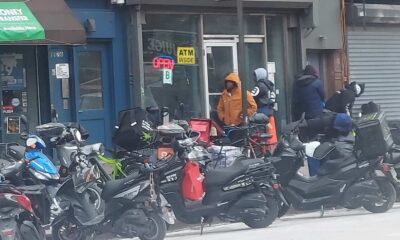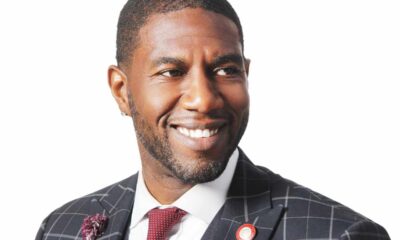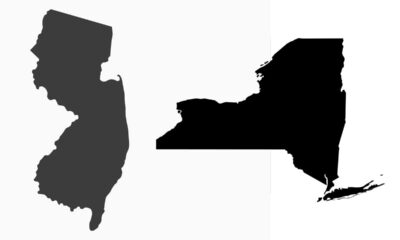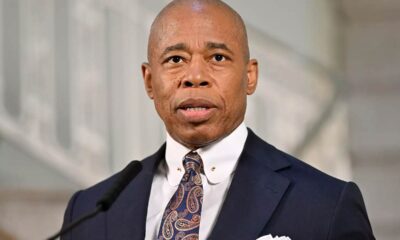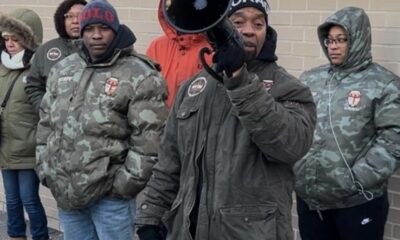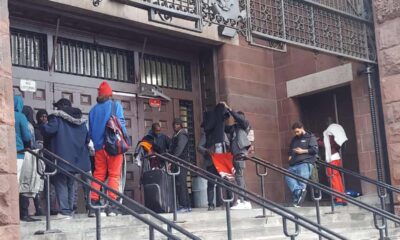Community News
Migrant Impact in NYC: Pitting the Poor Against the Poorest

By Nayaba Arinde
Editor-at-Large
“It is like they are creating a ‘poor versus the poorest situation,” AT Mitchell, founder and CEO of Brooklyn’s Man Up Inc., told Our Time Press. “They are pitting us against each other. The feeling that I am hearing on the street is that they are being given priority over people who have been here already. It’s like someone is promoting that.”
This is a nation of migrants/immigrants, save for the kidnapped Africans brought to these shores and the indigenous people whose land was stolen.
Since last April, opposite opinions have run parallel about the arrival of almost 170,000 migrants, defiantly transported to the city by Texas and Florida Republican Governors Gregg About and Ron DeSantis.
And so New York became the destination for tens of thousands of migrants from nations such as Venezuela, Nicaragua, Ecuador, China, Guinea, Mali, Senegal, and the Ivory Coast.
The situation has NYC housing and social service systems straining at the seams.
“This is why it’s a Black crisis,” Attorney Tareian Alexis King told Our Time Press. “This is how the system is trapping the migrants. They cannot file for workout authorization until they file for asylum, and when they file for asylum, they need an attorney. But, the Venezuelans and Hispanics have TPS and can work immediately.”
The New York-based international lawyer, with an office in Senegal, stated, “This is why this is a Black crisis. They have to wait 150 days to apply for work authorization, and what is someone going to do for 150 days?”
New Yorkers step up.
The migrants are housed in hotels, homes, mosques, and community spaces like Floyd Bennett Field, and food, toy, and clothing drives and GoFundMe accounts are created. Members of the community drive up to shelters like the Bedford Armory on Atlantic Avenue, pop their trunks, and give out food and clothes to the now predominantly African migrants. Many of the former Latino residents with TPS – Temporary Protected Status have moved on.
“The biggest issue is the lack of legal knowledge. Getting here was only one part; staying here was an entirely different part. Having all of these resources, such as IDs and housing, is not going to matter if they have a deportation – if they have an order of removal that they cannot fight – because they will get deported,” Attorney King told Our Time Press. “They have to have an attorney. Asylum is a legal fight. Immigration is legal. When our new neighbors enter America automatically when they come into the border, they are given an order of removal. Meaning that ‘We are sending you back to where you just came from,’ and so when they get in, they actually have to apply for asylum to be able to fight that order of removal. However, when they come in, they are focusing on housing because they are homeless. They focus on food because they don’t have any food. When they come in, they have to have an attorney, and to file for asylum, they only have one year to apply.”
Last week at the 53rd Annual Black, Puerto Rican, Hispanic, and Asian Legislators Caucus weekend, New York State Senator Cordell Cleare hosted a workshop entitled: “The Hidden Crisis: African Migrants in New York.” Issues like housing, the need for work permits, access to food, and culturally-sensitive support systems were discussed.
While Venezuelan migrants have been granted TPS – giving them access to funds, housing, and work permits, migrants and asylum-seekers coming from select West African nations – have not.
Sheikh Musa Drammeh, the community leader and activist, told Our Time Press that there is a movement to get TPS for the African asylum seekers from Guinea, Mauritania, Senegal, Mali, The Gambia, and Ivory Coast.” Advocates are working on it, and I believe Temporary Protected Status will be granted.”
Meanwhile, migrants selling hats and scarves and electronics like ear pods are a common sight on streets like 125th Street in Harlem. Mr. Mitchell told Our Time Press that vending is one of the best ways for a person to set up an independent business, so long as it is legal, and selling items like clothes, oils, and books.
“In the city of New York, the majority of the vendors are foreigners. What programs are in place that allow them to vend without being harassed by the police, but brothers in the hood can’t? That’s going to create more strife. I think that the solution is that there should be an equitable program that allows people who have been here and are willing to legitimately vend on the streets to have designated places where they can do that.
“I hear a lot of politicians say, ‘They are here; they want to work. There’s thousands of jobs.’ But, if thousands of jobs are willing to hire people coming here without documentation, why aren’t those jobs being made available for people who have been here already and giving them that same sort of push and support?”
Mr. Mitchell added, “It’s sad because our people are not even realizing that they are being played into a situation. People believe in divide and conquer. If we are united on these very simple issues like housing, employment, and entrepreneurship, then we would be able to take advantage of these opportunities fully. These opportunities would be more equitably distributed where the need is greatest. But, if that’s not what is being promoted, then it is ‘us versus them.’ They are being pitted against each other for the same food, for the same benefits, for the same housing, for the same opportunities, and it shouldn’t be that way at all.”


